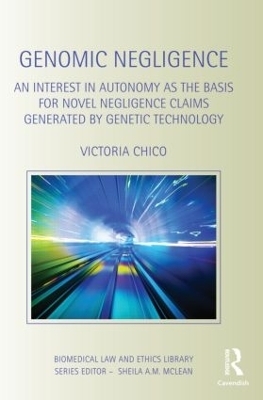
Genomic Negligence
An Interest in Autonomy as the Basis for Novel Negligence Claims Generated by Genetic Technology
Seiten
2011
Routledge (Verlag)
978-0-415-49518-9 (ISBN)
Routledge (Verlag)
978-0-415-49518-9 (ISBN)
Advances in human genetics are set to revolutionise the way we think about our health. Within the context of such changing social circumstances, this book identifies novel grievances that might be generated by modern human genetic technologies and considers how the English tort regime might respond to these grievances.
Advances in genetic technology will lead to novel legal challenges. This book identifies four potential genomic claims which may be articulated as novel negligence challenges. Each of these claims is considered from the perspective of the English courts’ approach to novel kinds of damage. It is argued that these novel genomic claims are unlikely to be favourably received given the current judicial attitude to new forms of damage. However, Victoria Chico argues that the genomic claims could be conceived of as harm because they concern interferences with autonomy. Each claim is considered from the perspective of a hypothetical English negligence system imbued with explicit recognition of the interest in autonomy. Chico examines how recognition of this new form of damage would lead to novel genomic negligence claims being treated in a way which they would not, if considered within traditional parameters of harm in negligence.
Advances in genetic technology will lead to novel legal challenges. This book identifies four potential genomic claims which may be articulated as novel negligence challenges. Each of these claims is considered from the perspective of the English courts’ approach to novel kinds of damage. It is argued that these novel genomic claims are unlikely to be favourably received given the current judicial attitude to new forms of damage. However, Victoria Chico argues that the genomic claims could be conceived of as harm because they concern interferences with autonomy. Each claim is considered from the perspective of a hypothetical English negligence system imbued with explicit recognition of the interest in autonomy. Chico examines how recognition of this new form of damage would lead to novel genomic negligence claims being treated in a way which they would not, if considered within traditional parameters of harm in negligence.
Victoria Chico is a Lecturer in Law at the University of Sheffield, UK.
Introduction 1. Some Genetic Science which is of Significance to Novel Genomic Negligence Claims 2. The Recognition of New Interests and Corresponding Duties of Care in English Negligence Law 3. An Interest in Autonomy as the Basis for a New Head of Damage in Negligence: Possible Interpretations and Limitations 4. Negligence in Reproductive Genetics: The Wrongfully Created Person and a Claim Based on the Interest in Autonomy 5. Negligence in Reproductive Genetics: The Parents’ Perspective 6. Genetic Information: Failure to Disclose a Genetic Risk 7. Genetic Information: Unwanted Disclosure of a Genetic Risk. Conclusion
| Erscheint lt. Verlag | 21.4.2011 |
|---|---|
| Reihe/Serie | Biomedical Law and Ethics Library |
| Verlagsort | London |
| Sprache | englisch |
| Maße | 156 x 234 mm |
| Gewicht | 560 g |
| Themenwelt | Medizin / Pharmazie ► Gesundheitswesen |
| Recht / Steuern ► Allgemeines / Lexika | |
| Recht / Steuern ► EU / Internationales Recht | |
| Recht / Steuern ► Privatrecht / Bürgerliches Recht ► Besonderes Schuldrecht | |
| Recht / Steuern ► Privatrecht / Bürgerliches Recht ► Medizinrecht | |
| ISBN-10 | 0-415-49518-0 / 0415495180 |
| ISBN-13 | 978-0-415-49518-9 / 9780415495189 |
| Zustand | Neuware |
| Haben Sie eine Frage zum Produkt? |
Mehr entdecken
aus dem Bereich
aus dem Bereich
steueroptimiert übertragen und den Schenker absichern
Buch | Softcover (2023)
C.H.Beck (Verlag)
14,90 €
Vertragliche Schuldverhältnisse
Buch | Softcover (2022)
C.F. Müller (Verlag)
26,00 €
Bürgerliches Gesetzbuch, EuErbVO, ZPO, FamFG, BeurkG, HöfeO, ErbStG, …
Buch | Softcover (2023)
dtv Verlagsgesellschaft
25,90 €


